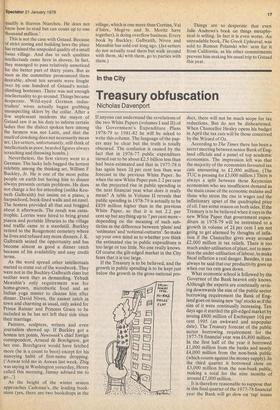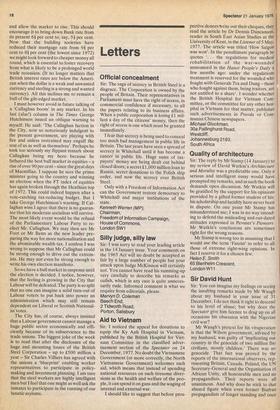In the City
Treasury obfuscation
Nicholas Davenport
If anyone can understand the revelations of the two White Papers (volumes I and II) of the Government's Expenditure Plans 1978-79 to 1981-82 he will be asked to write this column. The language of the papers may be clear but the truth is totally obscured. The confusion is caused by the fact that in 1976-77 public expenditure turned out to be about £2.5 billion less than had been estimated and that in 1977-78 it has again been 2i per cent less than was forecast in the previous White Paper. So when the new White Paper puts 2.2 per cent as the projected rise in public spending in the next financial year what does it really mean? A table in Volume II reveals that public spending in 1978-79 is actually to be £839 million higher than in the previous White Paper, so that it is not 2.2 per cent up but anything up to 7 per cent more — depending on the meaning of such subtleties as the difference between `plans' and 'estimates' and 'notional outturns'. So make up your own mind as to whether you think the estimated rise in public expenditure is too large or too little. No one really knows. Of course the gilt-edged market in the City fears that it is too large.
If the Treasury is to be believed, and the growth in public spending is to be kept just below the growth in the gross national pro duct, there will not be much scope for tax reductions. But do not be disheartened. When Chancellor Healey opens his budget in April the tax cuts will be those conceived by the Wizard of Oz.
According to The Times there has been a secret meeting between senior Bank of England officials and a panel of top academic economists. The impression left was that the majority of the economists favoured tax cuts amounting to £2,000 million. (The TUC is pressing for 0,000 million.) There is always a split between those Keynesian economists who see insufficient demand as the main cause of the economic malaise and those who stress the rise in wages and the inflationary upset of the quadrupled price of oil. I see some reason on both sides. If the Treasury is to be believed when it says in the new White Paper that government expenditure in 1978-79 will be restrained to a growth in volume of 2/ per cent I am not going to get alarmed by thoughts of inflation if the Chancellor gives away around £2,000 million in tax reliefs. There is too much under-utilisation of plant, not to mention the under-utilisation of labour, to make fiscal inflation a real danger. Besides, it can always be said that our productivity goes up when our tax rate goes down.
What economic school is followed by the Governor of the Bank heaven only knows. Although the experts are continually revising downwards the size of the public sector borrowing requirement the Bank of England goes on issuing new 'tap' stocks as if the size of it were continually increasing. Ten days ago it startled the gilt-edged market by issuing £800 million of Exchequer 101 per cent 1995 (an awkward and unpopular date). The Treasury forecast of the public sector borrowing requirement for the 1977-78 financial year was £6,800 million.
In the first half of the year it borrowed £1,000 million from the banks and nearly £4,000 million from the non-bank public (which counts against the money supply). In the third quarter it borrowed close on 0,000 million from the non-bank public, making a total for the nine months of around £7,000 million.
It is therefore reasonable to suppose that in this final quarter of the 1977-78 financial year the Bank will go slow on `tap' issues and allow the market to rise. This should encourage it to bring down Bank rate from its present 64 per cent to, say, 54 per cent. Now that the building societies have reduced their mortgage rate from 94 per cent to 84 per cent (the lowest since 1972) we might look forward to cheaper money all round, which is essential to foster recovery from what is likely to be a prolonged world trade recession. (It no longer matters that British interest rates are below the American when the dollar is a weak and unwanted currency and sterling is a strong and wanted currency). All this inclines me to remain a bull of the gilt-edged market.
I must however avoid in future talking of a `Callaghan boom' in any market. In his last (alas!) column in The Times George Hutchinson issued an oblique warning to myself. He said: `The Callaghan faction in the City, now so notoriously indulgent to the present government, are playing with fire and unless restrained may engulf the rest of us as well as themselves'. Perhaps he took too seriously my flippant remark about Callaghan being my hero because he fathered the best bull market in equities — a rise of over 90 per cent—since the great days of Macmillan. I suppose he sees the prime minister going to the country and winning an election when the FT index of equities has again broken through the Heathian top of 1972. This could indeed happen after a vote-catching tax-reducing budget. But I take George Hutchinson's warning. If Callaghan wins I agree that there is no guarantee that his moderate socialism will survive. The most likely event would be the refusal of the Parliamentary Labour Party to re
elect Mr. Callaghan. We may then see Mr Foot or Mr Benn as the new leader pre paring the way for more nationalisation and the abominable wealth tax. I confess I was wrong to suppose that Mr Callaghan could be strong enough to drive out the extremists. He may not even be strong enough to write his own election manifesto.
So we have a bull market in suspense until the election is decided. I notice, however, that the feeling is growing in the City that Labour will be defeated. The party is so split that no one can imagine a solid turn-out of Labour voters to put back into power an administration which may still remain dependent on Liberal or Scottish Nationalist votes.
The City has, of course, always insisted that a Labour government cannot manage a huge public sector economically and effi ciently because of its subservience to the trade unions. The biggest joke of the week is to read that after the disclosure of the huge and mounting losses of the British Steel Corporation — up to £500 million a year — Sir Charles Villiers has agreed with the unions a 'blueprint' enabling worker representatives to participate in policymaking and investment planning. I am sure that the steel workers are highly intelligent men but I feel that one might as well ask the inmates to participate in the running of our lunatic asylums.



































 Previous page
Previous page